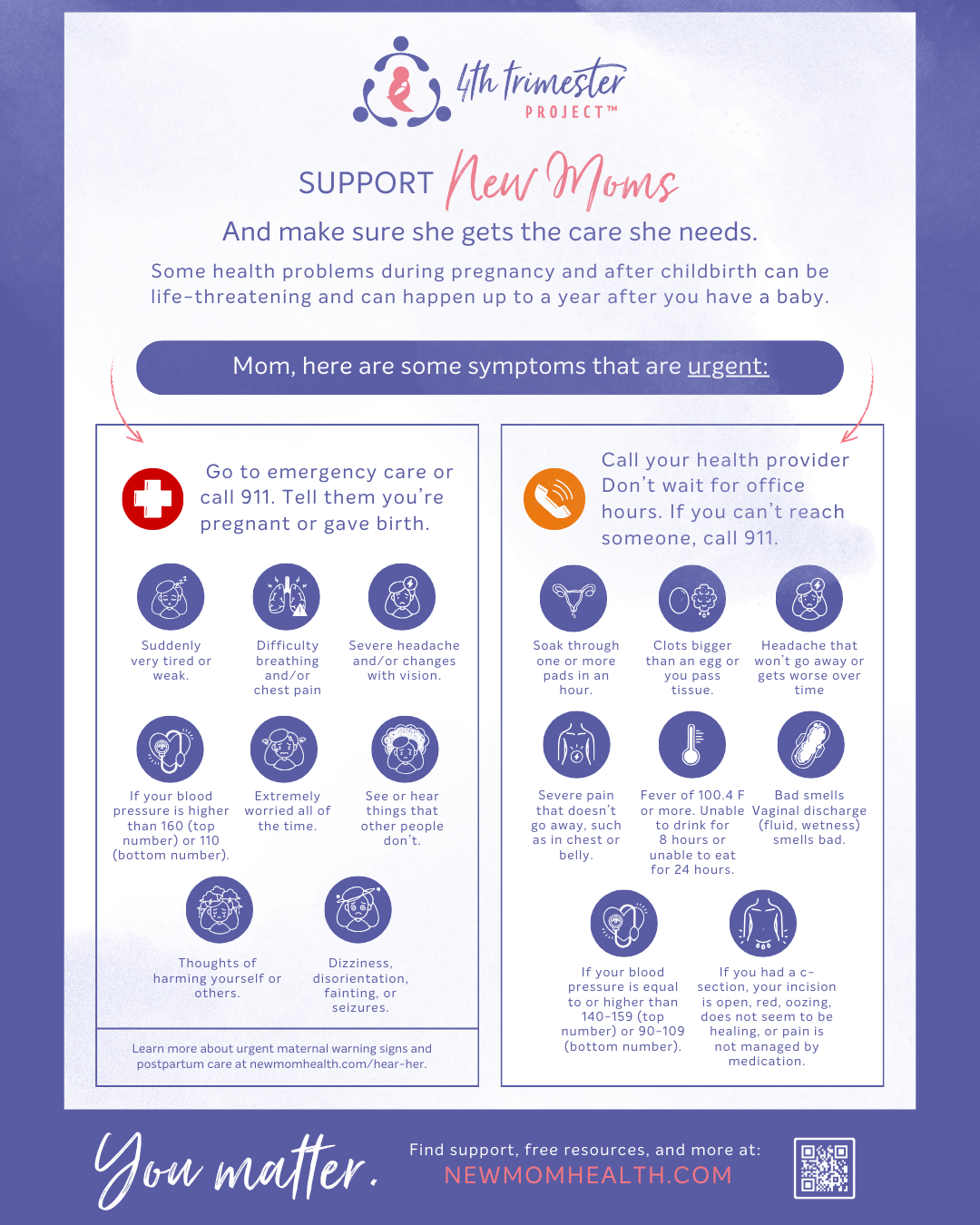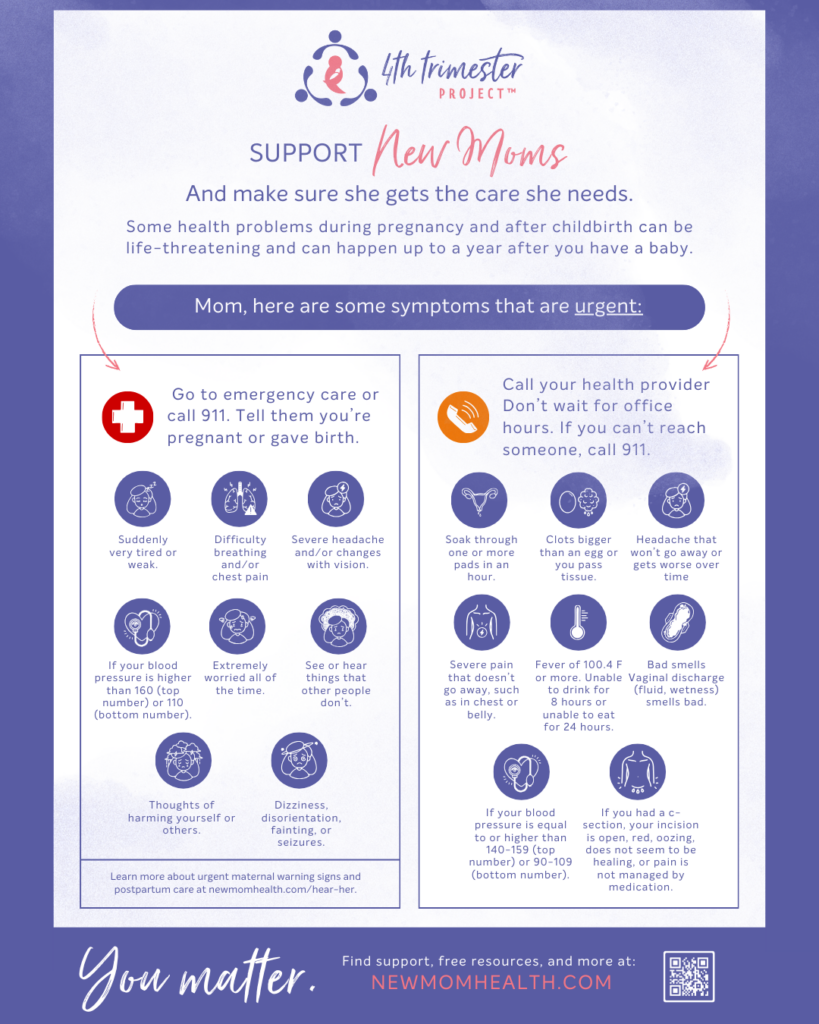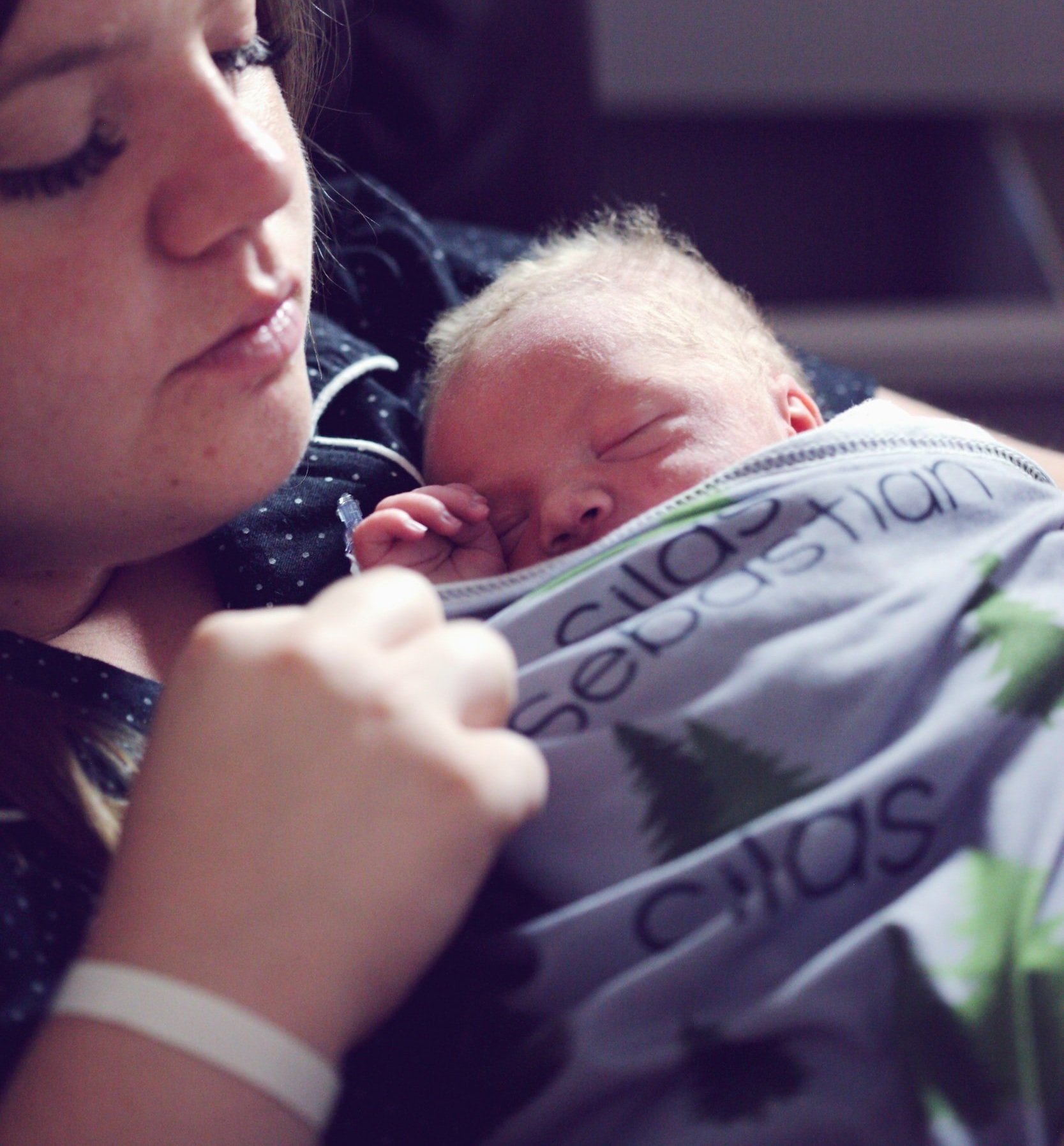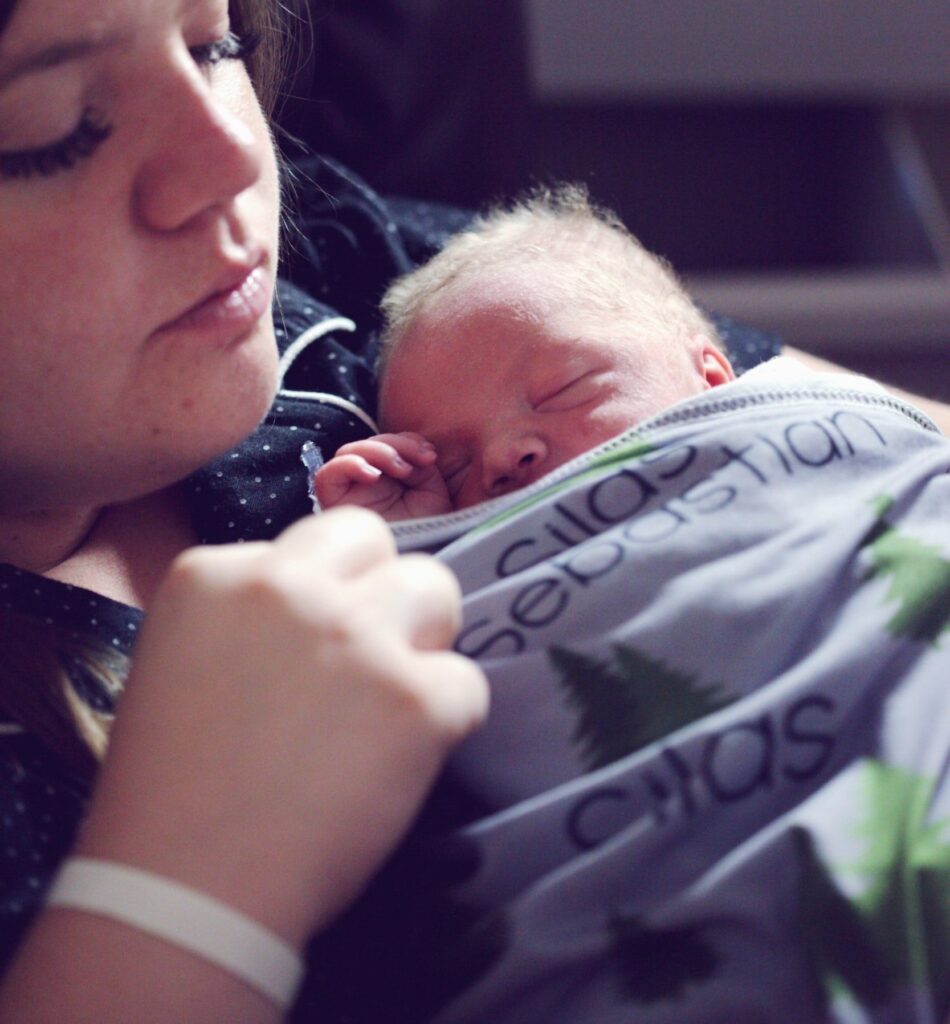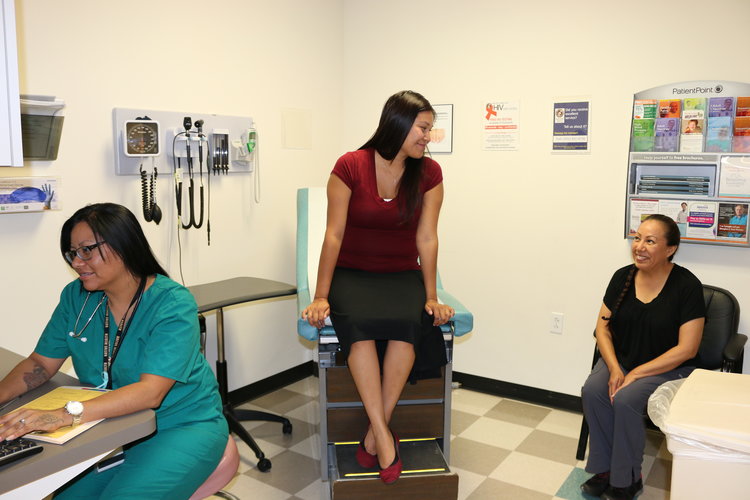Postpartum Mental Health, Mood & Anxiety Disorders (PMAD)
Staying Well
Self-care is not selfish! It can feel like a luxury for new mothers who are doing their best to keep everything together, but it is a necessity. With all that comes with the birth of a baby, birthing people often put their needs last. This sadly reflects a lack of enough community and social support. How moms feel matters! Feeling good and strong is important for mothers' health and also helps families thrive.
This section offers information to support women in receiving the care they deserve.
Mindfulness matters! Dr. Karen Sheffield-Abdullah has created a video series of mindfulness exercises to view and practice.
Accepting help is a sign of strength. Giving people an opportunity to care for you can bring your bond closer. They are excited about this part of your life, and that joy reflects their love for you too.
Topics in Staying Well
Urgent Maternal Warning Signs
Urgent Maternal Warning Signs
Did you know some health problems after giving birth are life-threatening and can happen up to a year after you have a baby? Support new moms and make sure they get the care they need. Recognizing when something isn’t right and taking urgent action could save Mom’s life. Learn about and recognize the maternal health red […]
Your Hormones
Your Hormones
During pregnancy, your placenta cranks out the hormones estrogen and progesterone. Some of that progesterone changes into a hormone called allopregnanolone, which binds to a receptor in the brain called GABA. The GABA receptor relaxes you – it’s the same receptor that alcohol and medications like valium bind to. During pregnancy, moms are essentially swimming […]
Managing Your Conditions
Managing Your Conditions
Pregnancy is considered to be a “stress test” for life. This means that health issues in pregnancy, such as gestational diabetes, heart problems, or high blood pressure, mean that there is a greater risk of having these conditions in the future (even if they get better after birth). This can be scary information to consider. […]
Postpartum Support Plan for New Parents
Postpartum Support Plan for New Parents
Like a labor and delivery plan, this is a fillable, custom plan for mom and families to share how they want to be supported after childbirth
Postpartum Mother Health Information
Postpartum Mother Health Information
Postpartum recovery red flags and important health information after childbirth page
Postpartum Health & Recovery Video Reel Series
Postpartum Health & Recovery Video Reel Series
Short videos on postpartum health & recovery FAQ
Taking Care of You
Taking Care of You
Postpartum Recovery Booklet on a variety of health and self-care topics
Your Postpartum Healthcare Plan
Your Postpartum Healthcare Plan
Fillable, custom medical care plan for mom to understand recovery and health information from their provider
Childbirth Trauma and Maternal Near-Miss
Childbirth Trauma and Maternal Near-Miss
Childbirth Trauma Giving birth is a powerful experience and the journey often unfolds in ways we might not expect and cannot control. Sometimes women feel that their transition to motherhood is traumatic. This may result from unexpected or unwanted medical interventions during labor and birth and/or postpartum, the speed at which they labored, the way […]
Hyperemesis Gravidarum
Hyperemesis Gravidarum
Women who experienced hyperemesis gravidarum (HG) during pregnancy may take up to two years for their bodies to recover. HG is a severe form of nausea and vomiting in pregnancy that is usually non-stop and keeps mothers from being able to take in enough food and liquid. Women who had HG and it wasn’t recognized […]
Immunizations
Immunizations
Immunization in the postpartum period is a simple and effective way for women to protect themselves and their babies from certain infections. This is particularly important for women who weren’t immunized before or during pregnancy. Postpartum maternal immunization can prevent maternal infection and the potential spread of illness from the mother to her baby. As […]
Thyroid Problems
Thyroid Problems
Uncontrolled thyroid disease is associated with heart disease, weight changes, and depression. Some women can have postpartum thyroiditis who didn’t have thyroid disease before they were pregnant. Symptoms include anxiety, irritability, rapid heartbeat or palpitations, unexplained weight loss, increased sensitivity to heat, fatigue, tremors, and not being able to sleep. A thyroid function test […]
Autoimmune Disorders
Autoimmune Disorders
Uncontrolled autoimmune disorders are associated with poor quality of life, disability, and sometimes increased risk of heart disease and other organ damage. Depending on your condition, you may have a flare and/or new or worsening symptoms after your baby is born. Your provider should work with you to find medications that are safe with breastfeeding […]
Coping with Stress
Coping with Stress
It can be wonderful and also very hard coping with a new baby. Partners and family members can be helpful AND also bring new challenges to the house. While many women worked hard during pregnancy to stop using tobacco, using marijuana, drinking alcohol, and using drugs, postpartum stress makes it very hard to stay quit. […]
Eating Well
Eating Well
Bringing a new baby into the world is a beautiful journey, but it’s also one of the most life-changing times in a birthing parent’s life. It is important to recognize that nutrition is not just about filling our plates; it’s about nourishing our bodies and minds. Especially after childbirth, nutrition is essential for recovery and […]
Exercise
Exercise
Movement is an important part of healing from pregnancy and childbirth. Exercise keeps bowels moving, eases stiffness, helps mood, and even improves the quality of sleep (when you can get it!). How much and how new moms exercise is influenced by how active they were during pregnancy and the way baby was delivered. In general, […]
Intimacy and Sex After Childbirth
Intimacy and Sex After Childbirth
“The quality of your intimacy is strongly influenced by the quality of your recovery. The more you focus on healing, the better you can feel when being intimate, and the more you can enjoy it. That is what’s most important.” View this video of postpartum intimacy from Nurse Nikki. Read her blog about talking about […]
Postpartum Health Care
Postpartum Health Care
Traditionally, the postpartum visit takes place 6-8 weeks after the birth of a baby. Given all that happens to women’s bodies in the early weeks after giving birth, many women find that visit to be too little and too late. There are also many women who never receive a postpartum visit! The American College of […]



